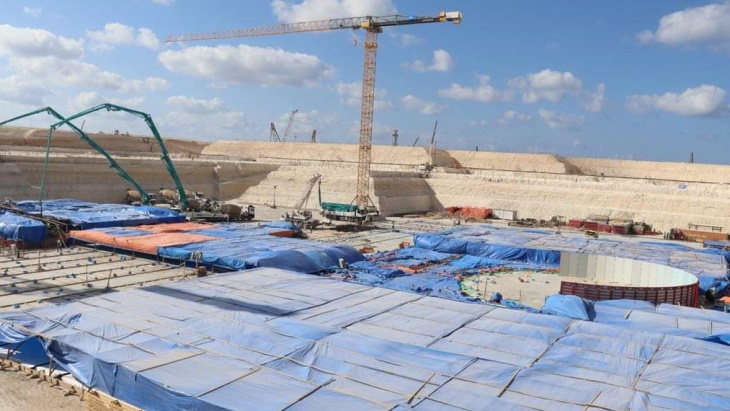Egypt's Nuclear Power Plants Authority (NPPA) has been granted a licence by the country's nuclear regulator for the construction of the fourth and final unit at the El Dabaa nuclear power plant. Construction of unit 4 is scheduled to begin by the end of this year.

Ground work in preparation for first concrete at unit 4 (Image: NPPA)
The Egyptian Nuclear and Radiological Regulatory Authority (ENRRA) carried out a comprehensive inspection at the El Dabaa site between 30-31 July, checking the readiness for commencement of construction of unit 4. It also "considered the results of the dialogue on the review and evaluation of the first, second and third units".
"The safety of the fourth unit of the Dabaa nuclear power generation plant was verified, and no risks were proven to threaten humans, the environment, and properties," ENRRA said.
NPPA said the issuance of the licence "is the culmination of a series of successful technical meetings between specialists of the NPPA and ENRRA to ensure that the licensing documents submitted meet all regulatory requirements and achieve the highest standards of nuclear safety, and to ensure the readiness of NPPA to start the construction process for the fourth nuclear unit".
It added: "It is planned, following the obtaining of the construction permit, to implement the technical works for the first concrete of the fourth nuclear unit during the fourth quarter of this year."
The El Dabaa nuclear power plant project - about 320 kilometres north-west of Cairo - is based on contracts between NPPA and Russia's state nuclear corporation Rosatom that entered into force on 11 December 2017. The plant will comprise four VVER-1200 units, like those already in operation at the Leningrad and Novovoronezh plants in Russia, and the Ostrovets plant in Belarus.
The contracts stipulate that Rosatom will not only build the plant, but will also supply Russian nuclear fuel for its entire life cycle. They will also assist Egyptian partners in training personnel and plant maintenance for the first 10 years of its operation. Rosatom is also contracted to build a special storage facility and supply containers for storing used nuclear fuel. Korea Hydro & Nuclear Power is constructing 80 buildings and supplying materials for the non-nuclear turbine islands.
NPPA applied to ENRRA for construction licences for units 3 and 4 in January 2022, six months after applying for those of units 1 and 2. Construction of unit 1 began in July last year, with that of unit 2 following in November. A construction permit for unit 3 was issued in March this year, with the first concrete poured for its nuclear island in early May.
Egypt's goal is for nuclear power to represent 9% of electricity by 2030, which would be achieved by the commercial operation of the first two units by that time, directly displacing oil and gas.
NPPA noted that the Dabaa plant will "achieve a tremendous boost to economic and technological development, and represents technological national security for the Arab Republic of Egypt, in addition to the clean, green, and cheap electrical energy it provides to meet the needs of the country's renaissance and development".
Researched and written by World Nuclear News